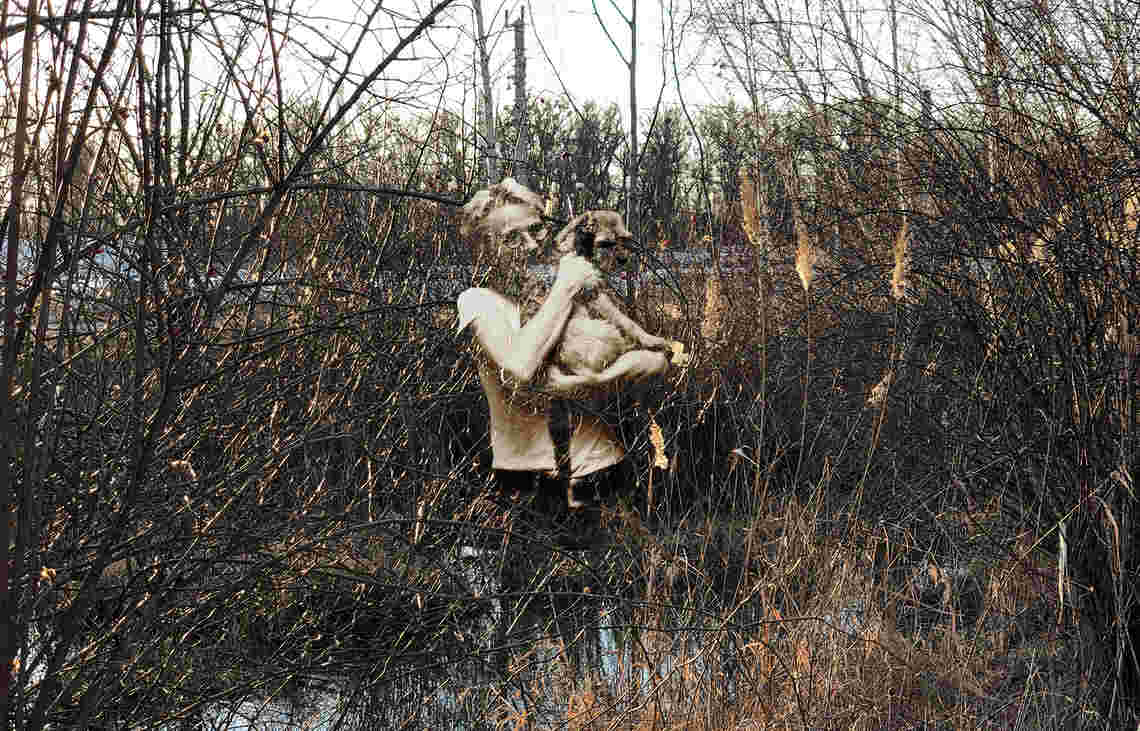

»The story how Biestmilch turned into the vision of my life, the strongest I ever had, needs a foreword«.
This line I wrote almost 10 years ago. At this time I thought I had solved the major issue of my life: restlessly searching for something I did know what it was. Today, January 2019, I sit at my desk and have to admit that I was completely wrong. The rollercoaster trail of my life just took a relatively long and smooth curve before tumbling back on the uncertainty and indeterminacy.
I never published the text back then titled »how I became a Biestmilch advocate«. Today seen from a distance I want to pick up the subject because the whole Biestmilch story was an experiment that can tell a lot about how our world ticks and what it means to do pioneer work.
In 2000 I ventured out into for me completely unfamiliar territory, and believe we, I was not aware of it at all. Passion und vision drove me. They were overriding reality in many ways.
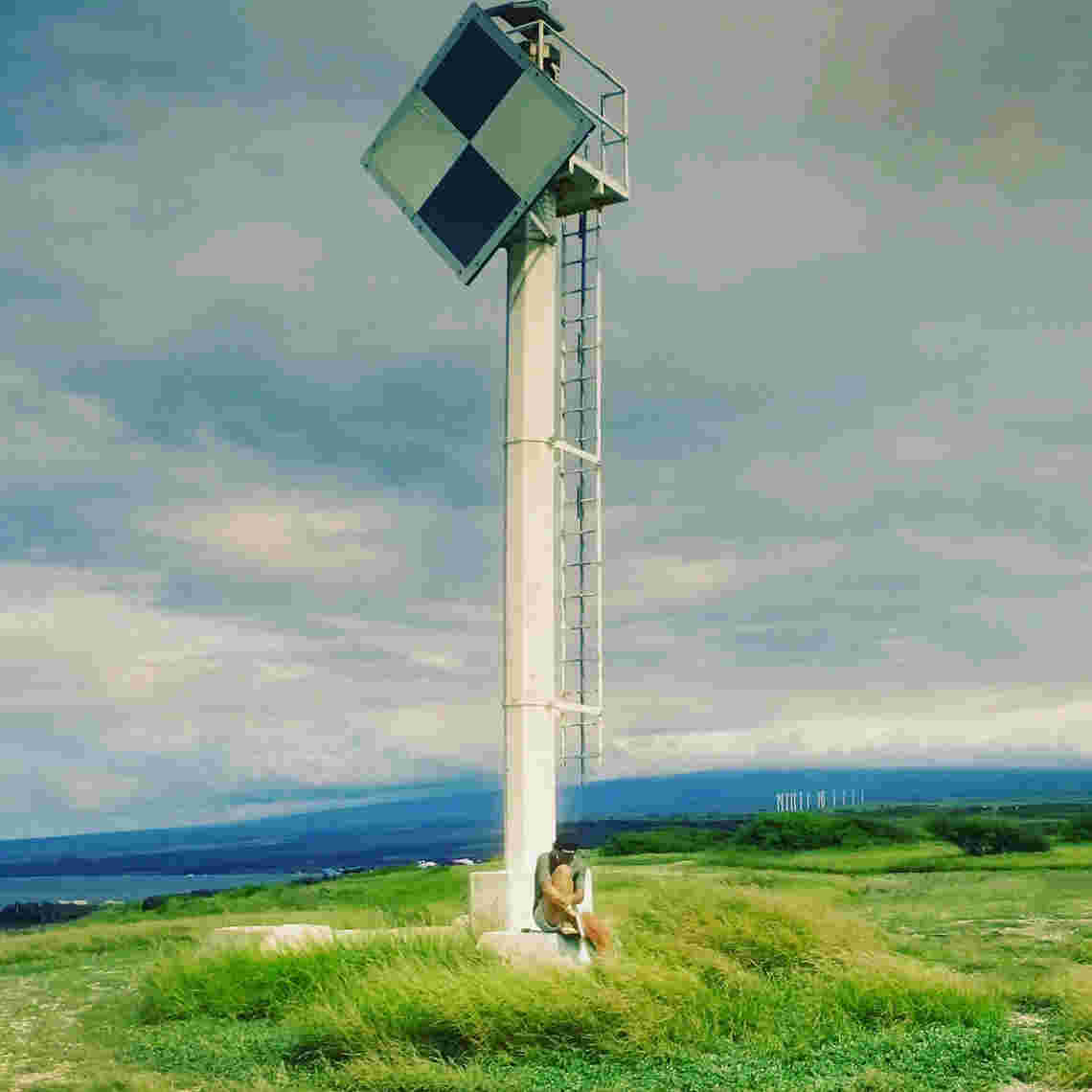
»By endurance, courage and passion we change« are the key words that guide me. I deleted the vision. Visions can harm, they disconnect you from real life and may make you reckless and even ruthless.
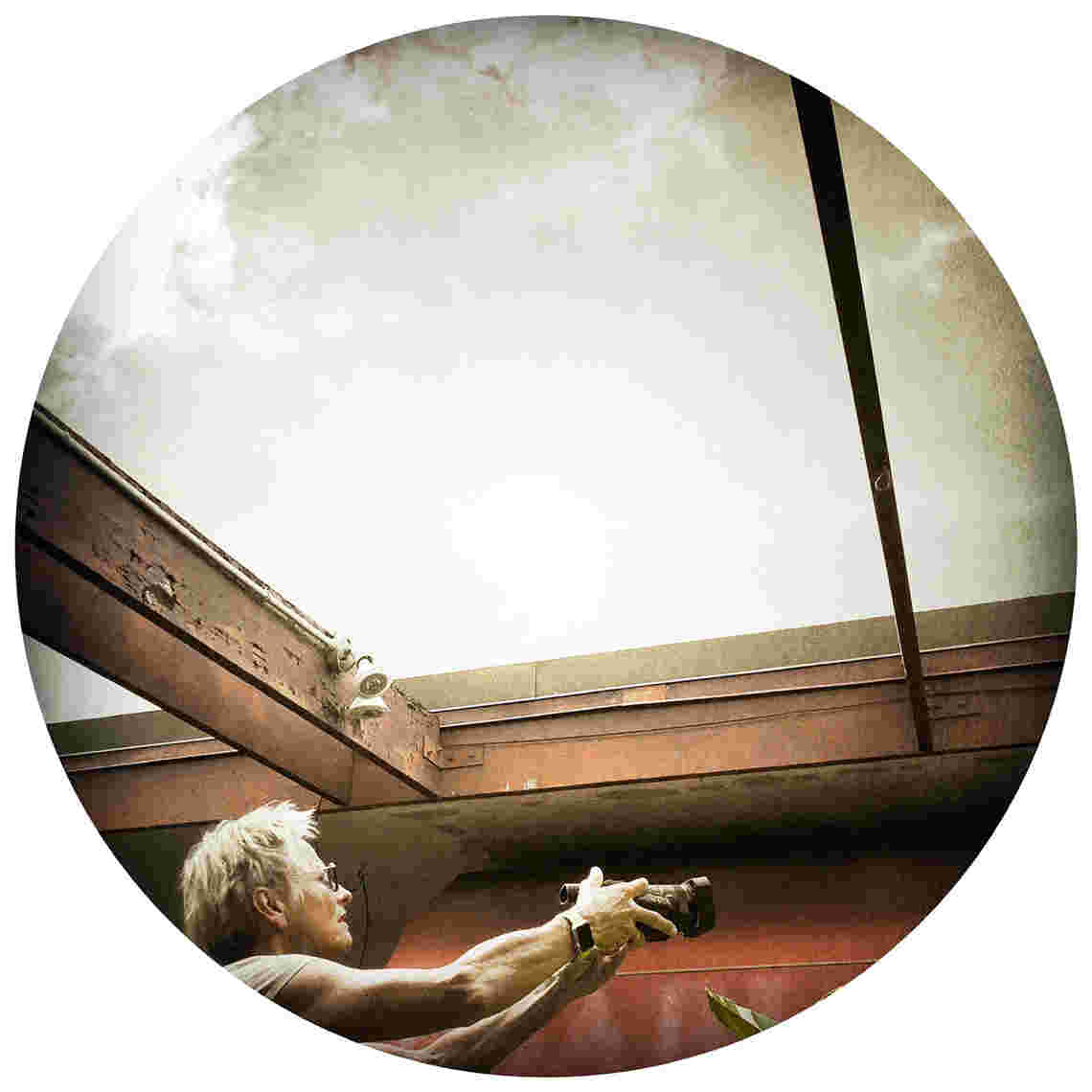
A glance back to the turning of the century. We are in the year 1999.
If certain crucial incidents had not happened in my life before Biestmilch, I would not have been able to even scratch the surface of understanding this amazing substance. I am still not there to comprehend it in all its depth and dimensions.
For having been able to achieve on what I am looking back today, I had to shift focus in many ways, and that influenced my whole approach to life. This may sound to you like I am a great romantic. No, I am not, I am just expressing what Biestmilch initiated in me. Compared to today, I was narrow-minded and struggling with my view on the world.
In the following chapter I would like to show my gratitude to all who inspired me on this sometimes hurting trail.
My education as a physician and my social upbringing had put me on the trail of natural science very early on in my life. Reflecting my past makes the picture I am painting here appear so clear. It was not when I was in my twenties and thirties. I was not aware that traditional Western tradition was so strongly ingrained in my body, I would have vehemently contradicted. It was more an unconscious process I felt uneasy with but not recognizing why.
A restlessness was ever since born into me that made me try out lots of different career paths. I always had a strong pull in me towards asking questions, and therefore was reading lots of books on epistemology, history of science and philosophy seeking for help for my messy life. My read was not systematically at all, it was all very emotional. I absorbed what I thought would make my life clearer. This was in the 70ies and 80ies when studying medicine in Vienna.
In all the confusion I had always one strong premise that accompanies me until today: "Don't talk about things you did not experience yourself."
Honestly, this was for many years the only frame of reference guiding my decisions. As a matter of fact this motto made me an incredibly lost and anxious creature. I still am, but today I have a frame that allows me to collect and organize knowledge, gives me criteria to make decisions, allows doubts without breaking, and finally made it possible to work on and with Biestmilch since several decades years. I never stayed with a job that long. I got bored and felt the void fastly.
As I don't intend to write my autobiography I cut too long a story shorter at this point and start out with the year '88. Returning back from my adventures in the UAE (this could be a chapter of yet another book) I had found a job at Biotest Pharmaceuticals in Frankfurt, my first in the industries. I wanted to quit medicine since quite some time and the only option as an ignorant doctor seemed to be pharmaceuticals. This company had in their product portfolio a colostrum derivative named Lactobin. It was an oral immunoglobulin preparation. Immunoglobulins were extracted from whole colostrum, the rest was discarded.
Today, I am so confident to say that this kind of processing removed a lot of the colostrum's power. Biotest has expertise with immunoglobulins and lacked the know-how of how to market Biestmilch/colostrum which is actually a food supplement and not a pharmaceutical, and they found no scientific access to colostrum as a whole. Clinical trials were performed in AIDS patients with severe diarrhea, in holiday travelers who caught a diarrhea and in patients suffering from hemolytic E. coli enteritis (in these case antibiotics are detrimental). I was working in the clinical research department and was involved in monitoring AIDS trials. They failed. The outcome to me was not surprising because you cannot corroborate an immune system that is more or less destroyed already and therefore cannot mount a immune response anymore.
I was familiar with this phenomenon due to the experience I had made during my work in the ICU. You cannot succeed in curing a septic patient, if his or her immune system doesn't respond anymore. The patient does not develop any fever and the hypotonia that develops is resistant to all therapy approaches. You see a picture of an organism that does not respond anymore. Unfortunately, death is very close then. Similar conditions applied to the AIDS patients that we tried to treat with Lactobin.
My friend as a microbiologist and much more experienced in immunology research than I was in those days, had already fathomed the power of oral immunization, I didn't. I was ignorant and too much focused on myself struggling with the new job in a completely strange and unfamiliar environment. My work as a doctor in the refugee camp of Chatila was still dominating my view on life, and the world of the industries was massively contrasting with my former life. I had enormous difficulties to cope with my situation.
Regardless of the studies' controversial results Lactobin made its way into the management of patients with chronic pain syndrome, and helped to elucidate the influence of the immune system on chronic pain. Many years later our Biestmilch made it into this therapeutic area as well, but now I am jumping ahead of time.
During my short time in this company, Biestmilch didn't play a role at all. Only a seed was planted into me, the interest for immunology and complex systems. I studied terribly stupid textbooks that gave my brain a strain, and made me feel too stupid to understand this topic. I left this company after having been mobbed with nerves shaken into bits and pieces.
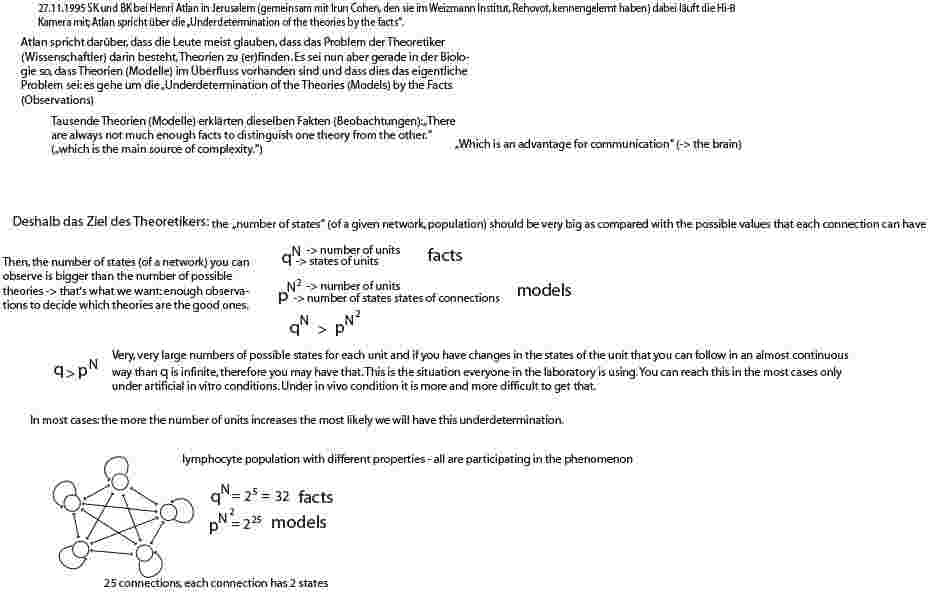
Notes made during a talk with Henri Atlan. He opened my mind for complexity.
After a short intermezzo in another pharmaceutical company I started working as a freelancer in 1993. I wrote marketing communication concepts for pharmaceutical companies. This was when I seriously got involved with immunology, neuroscience and cognitive science, and with the history and thought tradition of natural sciences. That meant reading, reading and more reading, books, publications, science papers. I hoped that would help me finding a knowledge trail that I could comfortably walk on in the future. This was not easy as I had no bearings yet to allocate what I had read. For years my knowledge resembled more a scrap yard than a library. I struggled.
But then finally end of 1994 I discovered a paper written by cell biologist Irun R. Cohen from the Weizmann Institute in Rehovot, Israel. This text was the door opener for my brain, it opened an avenue that I am walking on since. It was the key to finally connect to natural sciences beyond textbooks. Since my early days at school and until today I hate textbooks for they contain frozen knowledge, out-dated and often even harmful.
In his publication Irun used a very different language to present his data. I had never read a paper of such poetry before. His lead metaphor was Escher's artwork.
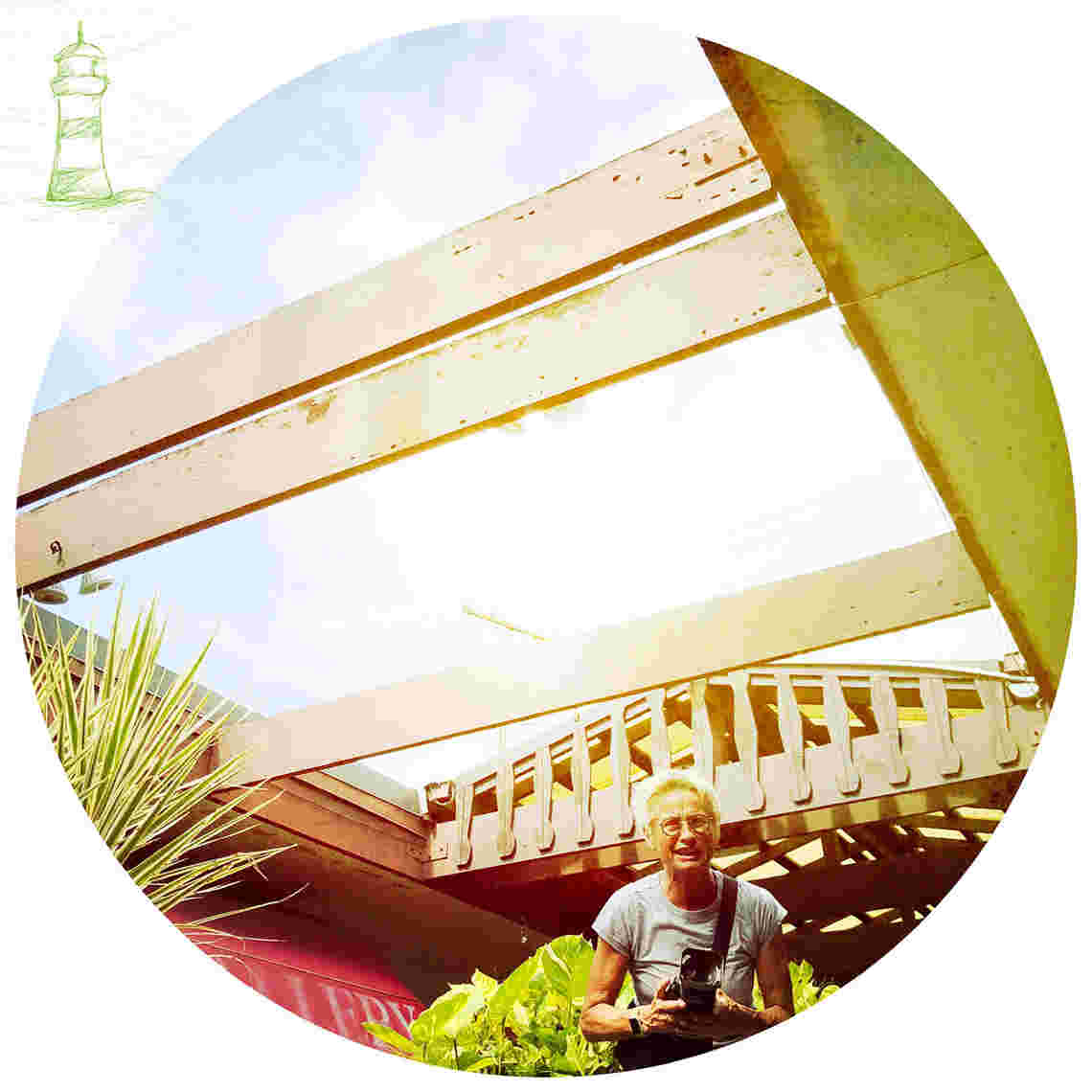
I was thrilled, excited. I finally had found something that touched my heart. Knowledge has to reach your heart otherwise it is worthless. Either it does not stick or it spams your brain. I immediately shared my passion with my brother.
What we did? Boldly we contacted Irun Cohen and off we were on an interesting and for us ground-breaking journey to Israel. That was in 1995, I was almost 40 years old, fairly late to get on track.
In Tel-Aviv we borrowed a 16 mm film camera and drove to Rehovot with the intention to interview Mr. Cohen.
Looking back today, I am sure he was amazed and amused about this weird couple arriving in his place with a big camera, no studio, no employer, no other credentials backing us and giving us a straightforward identity. He was not ridiculing us, he took our aim to trace the knowledge gaining process seriously, introduced us to his students to discuss with them, and made this trip to Jerusalem with us that, may I dare to say so, changed my intellectual life. He said, and I remember as if it were yesterday, "you have to get to know my friend the philosopher Henri Atlan."
In Jerusalem we met Henri who was even friends with the famous Austrian physicist and founder of the BCL (biological computer lab) in Illinois Heinz von Foerster I am a great admirer of until today. Henri Atlan introduced me to complexity science, to the automaton model, to the content and noise question, and much more (sketch from my brother). This day in Jerusalem was my very personal enlightenment. Of course, at that moment I did not yet know what the implications of this visit would be for the years that were yet to come.
Maybe it is my brother's and my social upbringing that we have never been really integrated in any professional network. Unfortunately (this is at least in parts my view today), we both never learnt to appreciat the power of networks, wanted to do things differently and on our own. If you are still young you love to oppose authorities, that's fairly normal and these networks (back then you did not call them that way, it were clubs, association, groups, coalition etc.) for us symbolized authority and mainstream.
This juvenile arrogant mindset makes life difficult, and believe me, we stumbled over many obstacles. On the other hand we got trained in "deviant thinking" that may occasionally be innovative. This is not mine to judge here, but yours.
Our approach to tackle the various topics was always multidisciplinary. During these years I made lots of experiences that help me today in my pioneer work with Biestmilch.
To put it in a nutshell, before we found Biestmilch and founded the company for marketing Biestmilch I have been working on ideas, concepts and set-ups that intended to enable communication on eye-level regardless of up-bringing and education. Our aim was to create situations where we were all non-experts in some way or the other. My brother's label for his current work hits it the best, it's called »Center of Shared Incompetence«.
It doesn't need a lot and you feel left to your own devices, situations where you bluntly feel that experts cannot make decisions for you. This is the case when you have to make decisions into an uncertain future, for example in the case of a lethal disease. An expert may at best you give tools at hand that make it easier for you to decide but he or she cannot make the decision for you.
Why I mention this? Because until today this is a crucial topic for me as Biestmilch is used in patients with fatal chronic health issues such as tumors.
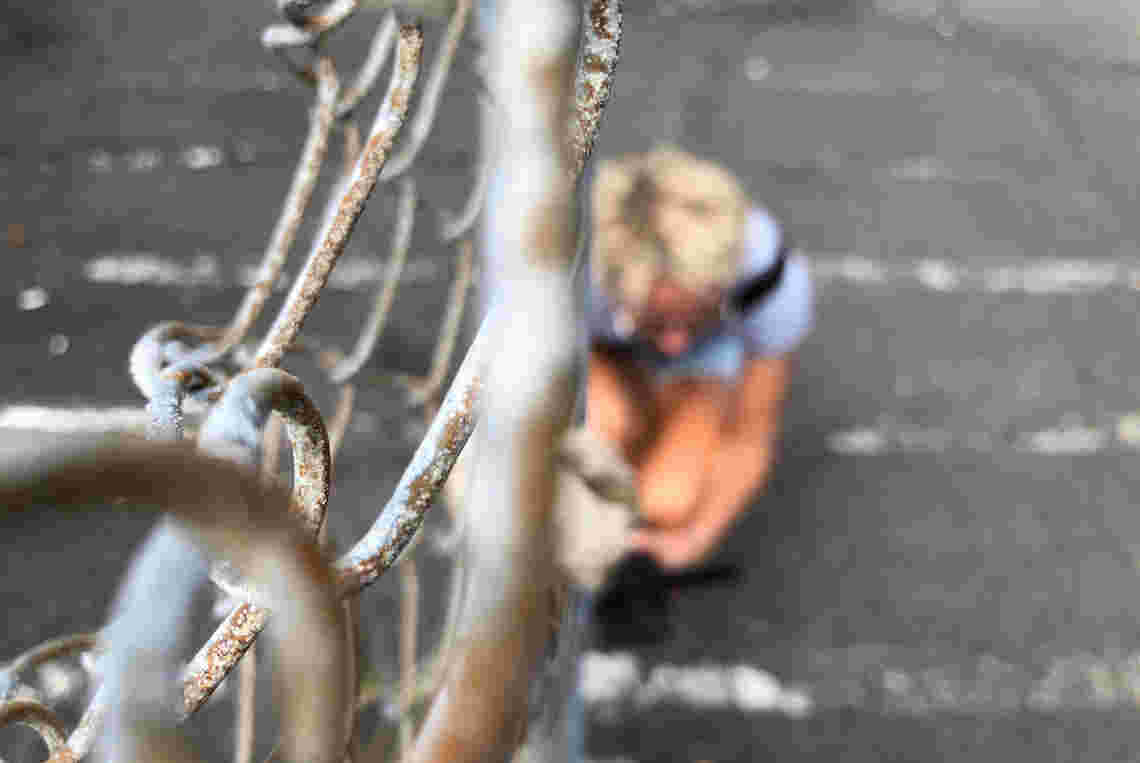
In the very end our society leaves the responsibility for decisions with the individual. The individual is surrounded by social intermediates (lawyers, tax attorneys, business consultants etc.) working as agents who do nothing else except redirecting responsibility through a densely woven intransparent network back to you. All together a prosperous money machine without taking the risk of responsibility. If you have been admitted to a hospital, you may well have experienced what it means to be responsible for yourself. You cannot count the papers and forms you have to fill out and sign. And they all say basically the same: If something goes wrong, the responsibility is all on you.
That's why we always thought it's worthwhile to spend time on analyzing the processes of decision-making in our society. I can conclude our work in a few words. »Don't rely on experts and expertise, they express their view only, they represent their networks and their interests. And there is always another way to look at things. Only because the majority thinks in certain way, doesn't mean that there may not be a better option for you.«
I am sorry that I squeezed a whole philosophy into a few sentences here. This paragraph is only to say that the way, the style, the methods I apply when I develop marketing concepts for Biestmilch are rooted in this past, a very creative time in the mid nineties that shaped my mindset a lot.
In parts I had succeeded to emancipate myself from dogmatic natural science. I saw immunology and the body from a vey different angle. Even though I lacked heaps of knowledge compared to today. My brother, my friend and I were struggling each of us in his or her very own way. This was when Colostrum popped up. It was my friend who was also involved in the Lactobin story at Biotest in the beginning of the nineties who brought it up again. My brother was convinced that it might be a good move to have some hardware to work with instead of stretching our brains and hardly making any money.
Intellectual property is not very highly ranked in our Western society. This was the tough lesson we had learned during past years.
We three were sitting in my small office in Wiesbaden, when we agreed to make Colostrum one focus of our lives. We founded the company together and we changed colostrum to Biestmilch, being the old German synonym, a word that is so bizarre that it sticks.
Three believers in the substance had found each other. Now we had a company, a name and a goal which was we wanted to create a brand, easily said difficult to achieve.
This was the moment when Biestmilch became the experiment of my life and began to dominate whatever I did. Looking back today makes it kind of an interesting case report story which I want to tell this site trying to assess the course of events from some distance.